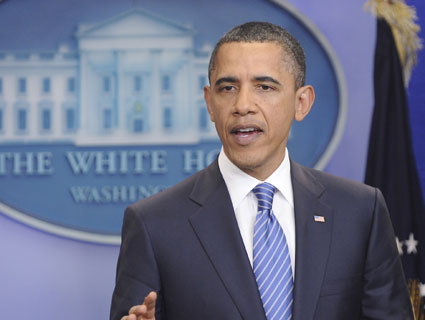When President Barack Obama delivered his big deficit speech this week, he didn’t offer many details. But when it came to savings in the health-care sector, the president made an exception, and got into the nitty gritty. Stressing the urgency of reining in health-care costs—the single biggest driver of government spending—Obama vowed to build upon the cost-containment measures in the Affordable Care Act, the landmark health reform bill he signed last year. One key feature of the new law is an independent Medicare panel that will have new authority to set payment rates and evaluate health-care spending. In his speech, Obama promised to slow the growth of Medicare costs even further by strengthening the authority of the panel, known as the Independent Payment Advisory Board (IPAB).
Unfortunately for the president, the Medicare panel is also one of the most widely misunderstood and reviled parts of health-care reform. Republicans have already launched an effort to repeal the commission, dubbing it the new “death panel.” What’s more, a growing number of Democrats are joining their effort to kill the panel, putting another thorn in Obama’s side.
Rep. Allyson Schwartz (D-Pa.) recently became the latest Democrat to sign onto the House Republicans’ IPAB repeal bill. As Politico reports, the conservative Blue Dog New Dem* is “the most high-profile Democrat yet” to join the GOP’s effort to scrap the payment board. While Republicans have slammed the panel for allowing faceless bureaucrats to “ration” care, Democratic opponents have taken a different tack—they criticize the panel for having the authority to bypass Congress. “Abdicating this responsibility, whether to insurance companies or an unelected commission, would undermine our ability to represent the needs of the seniors and disabled in our communities,” Schwartz wrote in a letter explaining her position.
Schwartz has now becoming the third House Democrat to support the Republican IPAB repeal effort: she joins Rep. Michael Capuano (D-Mass.), a member of the Progressive Caucus, and Rep. Shelley Berkley (D-Nev.), a centrist New Democrat who’s now running for Senate. The Medicare panel was never popular among House Dems, who refused to include it in their version of the health-care bill, with opposition coming from both liberal and conservative flanks of the party.
So while Obama want to strengthen IPAB to bring down the deficit, members of his own party want to dismantle it altogether. The lack of Democratic unity behind this central pillar of Obama’s plan reveals just how difficult it will be to reduce the deficit in any meaningful way.
*This has been corrected. Sorry.














